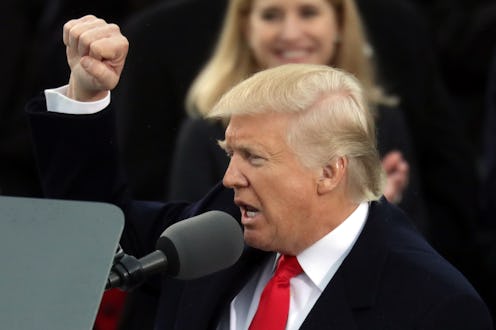News
We've Entered Constitutional Crisis Territory

In an exchange that was as fascinating as it was disturbing, President Trump's lawyers admitted in court Saturday that actually, the administration doesn't know how to legally justify its attempt to unilaterally and immediately ban travelers from seven Muslim-majority countries from entering the U.S. The legalities of Trump's recent executive order have come under immediate fire from all corners, and one could plausibly argue that the Muslim ban has plunged us into a Constitutional crisis.
Federal District Court Judge Ann Donnelly issued a temporary emergency injunction against many aspects of the ban. Before she did, lawyers for the Trump administration attempted to argue that, because the two travelers who filed the original lawsuit had been released from detention, the rest of the case should be thrown out — and the rest of the detainees sent home.
“What about the others in the class,” Donnelly asked, referring to other travelers who'd been detained. “If they had come here two days ago, we wouldn’t be here, right?”
"This has unfolded with such speed,” replied U.S. Attorney Susan Riley, who was representing the Trump administration, “that we haven’t had an opportunity to address the issues, the important legal issues.”
You might want to read that again. An attorney for the president said in court that the administration hadn't considered "the important legal issues" of the policy it implemented one day earlier. This suggests terrifying things about who's in charge of the federal government right now. It also renders all discussion about the "legality" of the ban unnecessary, since Trump's team itself admits that the policy can't be justified on legal grounds.
As for whether we're in a constitutional crisis, that's a bit more subjective. "Constitutional crisis" is an informal concept, not a firmly-defined state of affairs. Several episodes in American history have been referred to as Constitutional crises: the first death of an incumbent president; the secession of southern states prior to the Civil War; and the disputed election of 1876. Generally speaking, the term refers to either a deadlocked dispute that's unresolvable by constitutional means, or a succession of events that produces an unconstitutional outcome.
Does the Muslim ban meet that criteria? Arguably, it does: A federal court ordered the federal government to "permit lawyers access to all legal permanent residents being detained at Dulles International Airport," and yet federal customs agents at the airport are defying that court order, and preventing attorneys from speaking with permanent residents who've been detained. This flagrantly violates the separation of powers, and it's not clear what recourse there is to restore constitutional order in this situation.
If this is a constitutional crisis, though, it's the kind that can be resolved relatively quickly, if border patrol agents at Dulles and elsewhere in the country simply abide by the court order. It's a crisis, in other words, that potentially disappear tomorrow.
All of these legal questions are crucial, and will only become more so over the coming weeks and months. Let's also remember that, legalities aside, that the ban is problematic enough on moral terms. Simply put, unilaterally blocking all refugees from entering America is stunningly inhumane, tacitly racist, and a direct attack on the most fundamental of American values. Those aren't charges you can prove in court, but they're just as vital to keep in mind as we navigate this uncertain terrain before us.